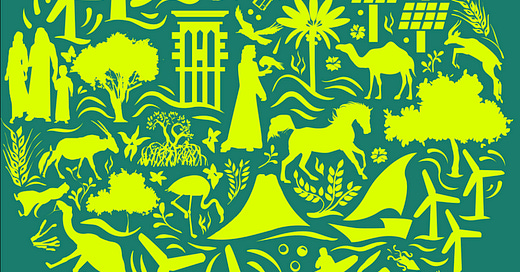With all the news about COP28 UAE - United Nations Climate Change Conference currently going on, if I’m serious about covering the Anthropocene, shouldn’t I be writing about it? Well, no. Here’s why.
The first reason is that COP28 is a big UN-type thing (and I mean BIG, as in: Do 70,000 People Really Need to Be at a Climate Confab?), and in general I’m a skeptic about big UN-type things. I don’t see any efficient way to wrangle the world’s governments to do much, especially given the expense involved. As noted previously, my take on the UN is that its best contribution is as a clearinghouse for ideas and data.
The second reason is that I am no expert, and it seems like one needs to be an expert to speak competently. (The same goes for my ill-advised mini-rant last week on effective altruism and the AI debacle.) Then, again, why does one have to be an expert? Don’t lay people, non-experts, the “little people” have a right (and responsibility) to keep abreast of world happenings, and to have a thought about it? In any case, I’ll pass.
Third, even though I want to understand (in layman’s terms) the Anthropocene, my sense is still not all about climate. As important as big megatrends are, as one of four main categories in thinking about the Anthropocene, and as important as energy is as one of the big megatrends (along with, say, population, economic growth, and biodiversity impacts), even the energy conversation concerns more than shifting off fossil fuels, for the sake of carbon reduction, for the sake of GHG (greenhouse gas) reduction, for the sake of limiting climate change. I daresay we need to do that. We can’t, however, stop producing energy, so the real conversation is about how to do that.
Still, at the very least, it’s certainly interesting to see COP hosted in Dubai with Arab leadership, and some surprising (and telling) things are coming out of it.
By the way, the other three categories of thinking about the Anthropocene, besides big historical megatrends, are problems of land and water use (the geographical fallout of the Anthropocene, not merely geological); the need for a circular economy to transform how humans “use” the planet’s resources; and what I call the “human factor.” Not only are humans the cause of the Anthropocene (it’s named after us), but we’re responsible to solve the problems we create. Technological progress is one way. But behavioral, cultural, social, economic, political, ethical, philosophical, and even religious factors come into play. These latter things comprise the human or “humanistic” factor.
What I really want to get into here on the Daily Inch (“ink” not “inch”), what I hope all humans can become a little more truly expert at, which is to be better humans. The Anthropocene is a fundamentally new and different mode of existence for our species on planet Earth. But there’s a lot of old wisdom that purports to help with those fundamental humanistic problems, such as cultivating virtue, wisdom, responsibility, self-restraint, charity, and so on.
This new/old conundrum is what I think of as The Question or The Tension. Can the “old wisdom” help with this new situation? I honestly don’t know.



